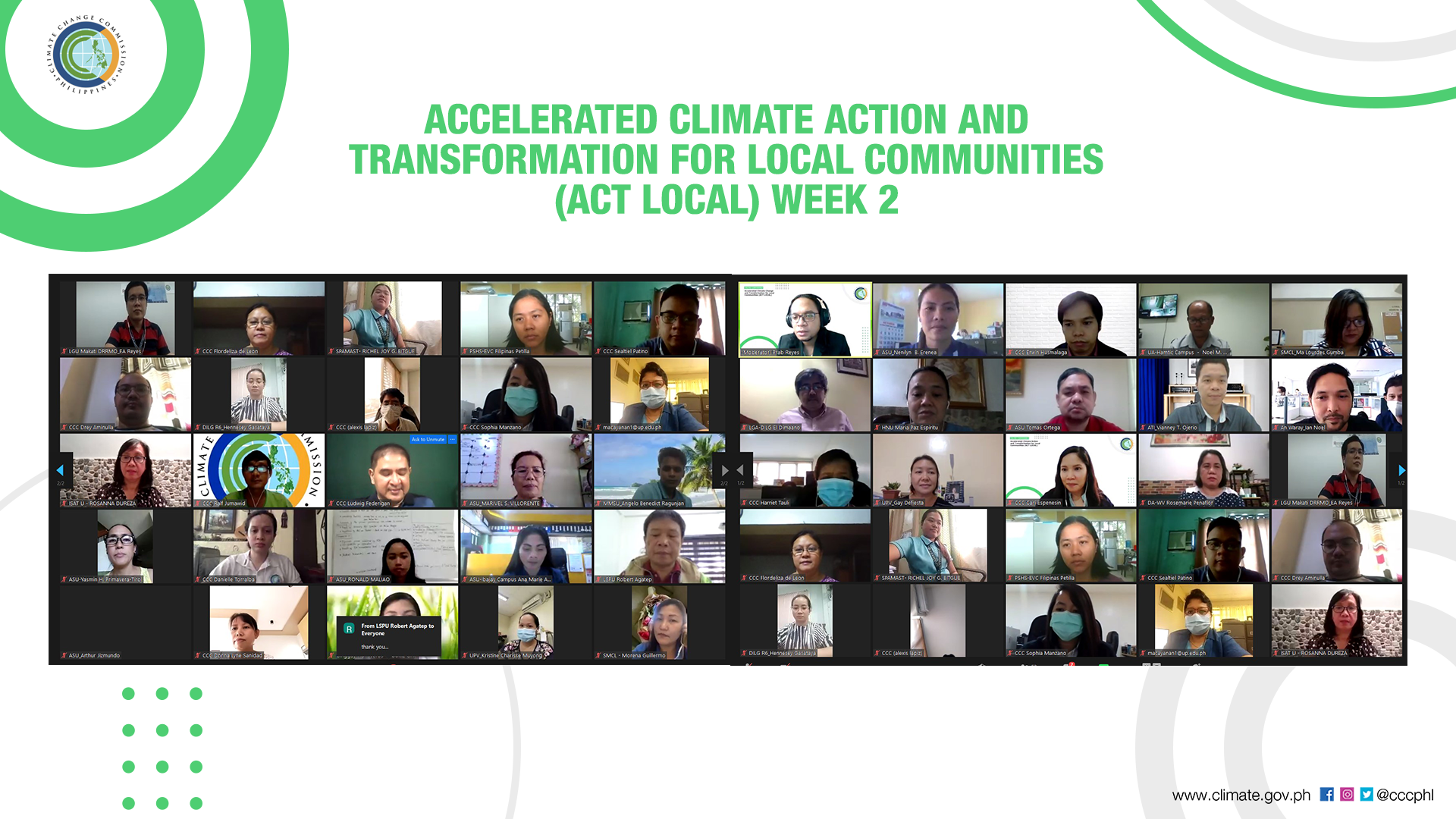
October 15, 2020 Thursday

MANILA, 16 October 2020 — In the second leg of the “Accelerated Climate Action and Transformation (ACT) Local Online Conference,” the Climate Change Commission (CCC), together with the Department of Interior and Local Government, underscored the critical role of higher education institutions (HEIs) in the development and enhancement of local climate change plans of local government units (LGUs).
The ACT Local Conference, a four-part online webinar organized by CCC, capacitates HEIs from the various regions in the Philippines to provide technical assistance on the climate science, issues, vulnerabilities, and risks to their respective LGUs and communities on the development of science-based and risk-informed local climate plans.
CCC Commissioner Rachel Herrera highlighted the established partnerships of CCC with several academic intitutions through regional consortiums, which serve as platforms for exchanging knowledge and best practices on climate action.
“Through this ACT Local Conference, this convergence initiative, we hope to consolidate and accelerate all our efforts to better support our communities and local government units to deal with the intensifying impacts of climate change. Our aim for this conference is to build their adaptive capacity by providing the right tools and information, enabling partnerships, and expanding networks for LGUs to lead climate action on the ground,” said Herrera.
“This will entail making use of the best available climate science and research to be utilized in your local development strategies and action plans on climate change. As frontliners, you must know the specific risks and threats faced by your communities, so you could plan better and more effectively. This is making the science work for us,” Herrera added.
Mr. Elmo L. Dimaano, Head of the Disaster Risk Reduction-Climate Change Adaptation (DRR-CCA) Section of the Local Governance Training and Development Division of the DILG-Local Government Academy, gave an overview of the development of the enhanced Local Climate Change Action Plans (eLCCAPs) and how these should be anchored on the country’s National Framework Strategy on Climate Change (NFSCC) 2010-2022 and the National Climate Change Action Plan (NCCAP).
“LCCAP is a document prepared by LGUs with substantial content on policies, programs, and measures to increase the community’s resilience to the impacts of climate change, and reduce greenhouse gas emissions. The NFSCC and NCCAP underscore the integration of [climate] adaptation and mitigation measures into all existing national and local plans and strategies,” said Dimaano.
Ms. Carizon G. Espenesin, Development Management Officer of the Strategic Partnership Division of CCC, discussed how the CCC’s flagship capacity building program, the Communities for Resilience (CORE): Convergence Initiative, supports the strengthening of cooperation between and among sectors towards mainstreaming climate change adaptation and mitigation in local development planning.
“This is not just a sole achievement of the Climate Change Commission. The CORE Initiative really espouses multi-stakeholder convergence within civil society organizations, national government agencies, local government units, private sector. Through this webinar, we are hoping to strengthen our partnership with the academic sectors—our higher educations institutions, local government and state universities and colleges,” said Espenesin.
The ACT Local Online Conference aims to formalize a sustainable partnership between the national government, academe, and the private sector in providing technical and/or financial resources to LGUs on climate action.
Through ACT Local, relevant stakeholders will be capacitated to assist and contribute to efforts that will generate information, boost capacity development, promote cooperation and convergence, facilitate vertical and horizontal alignment for development planning, and access to climate financing windows toward climate resiliency.
The third part of the online webinar, airing on October 20th, will focus on the overview of conducting entity- and community-level greenhouse gas inventory and national and local climate change expenditure tagging.
Interested participants may register through this link: https://www.eventbrite.
For more information about the ACT Local Online Conference and ACT Local Program, visit the Facebook page of the Climate Change Commission at www.facebook.com/CCCPhl.